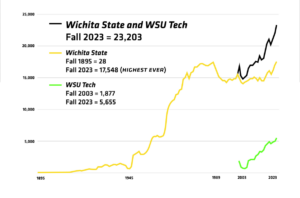Wichita, Kansas, is an aviation town. McConnell Air Force Base, located southeast of the city, was estimated to have an over $1 billion impact on the region, supporting nearly 10,000 direct and indirect jobs in fiscal year 2023. Fort Riley, an army base also recognized for aviation, is only a two-hour drive north.
“When aviation has a dip, we feel it,” says Jennifer Seymour, vice president of general education and skilled trades at the Wichita State University Campus of Applied Sciences and Technology, familiarly known as WSU Tech.
Local adult learners and veterans seeking to diversify their skillsets in other high-demand careers have turned to the community college in droves since it opened in 2003. Enrollment has increased by over 200% in two decades, and early census numbers suggest a consecutive record-shattering fall cohort, according to Seymour. “One of the keys to our success has just been our ability to pivot very quickly and respond to industry demands.”
Here’s another: WSU Tech is leveraging the “untapped market” of short-term certificates and other micro-credential opportunities through deeply intentional employer collaborations. It has integrated each of its academic offerings with non-credit certificate opportunities to meet industry partners’ demands. Its partnership this academic year with SkillStorm, an IT service management company, introduces Wichita’s workforce to stackable, credit-bearing certificates in Amazon Web Services’ cloud computing suite.

“When you see that there are not enough adults with a credential of value, it’s a win for them to pursue micro-pathways that are relevant to what they need in their life right now,” says Lisa Larson, senior vice president for college transformation and director of the Community College Growth Engine at the Education Design Lab. “These are [non-traditional] opportunities that can lead to a degree and get them the home they’ve wanted and to afford a family.”
Enrollment in non-degree credentials has increased by 80,000 students at community colleges since 2022, according to 2024 spring enrollment data from the National Student Clearinghouse.
Why the time is ripe for collaboration on micro-credentials
Stakeholders across higher ed and industry have found that the state of today’s workforce talent pipelines is a byproduct of colleges and employers failing to articulate what they need from each other. This issue has also plagued some of higher ed’s micro-credentials offerings.
“Many institutions treat [consultation from employers] as a checkbox and a compliance thing,” Seymour says. “Over the last couple of years, we’ve made a concerted effort to change our meetings into more of a collaborative model where we ask industry to engage with us, link arms and partner with us.”
WSU Tech is recognized as a leadership school for the National Coalition of Certification Centers, a nonprofit connecting educational institutions with global industry leaders. The college is also financially supported by the Perkins Grant, which rewards federal funding based on its yearly collaborations with employers on curriculum.
More from UB: Here are 3 ways your procurement office is changing
Employers have become more willing to engage with higher education leaders due to pressing workforce gaps in high-skilled tech positions, such as cybersecurity, IT and high-tech manufacturing jobs created by the CHIPS Act. Micro-credentials have become a popular means to close this divide since they invite adults without degrees to rapidly gain highly desired skill sets. Moreover, credit-bearing, stackable certificates provide these learners the flexibility to move up the corporate ladder.
“Employers are developing a talent pipeline that they can hire, advance and retain,” Larson says.
Over the last three and a half years, Larson and the Education Design Lab have helped over 75 community colleges across 20 states develop micro-credentials. Larson finds the three most sought-after micro-credentials pertain to allied health, IT and advanced manufacturing. The latter cover semiconductors, AI engineering and EV batteries.
Thanks to the Lab’s connection with over 500 employers, Montana has launched a statewide initiative challenging participating two- and four-year institutions to develop 12 to 20 micro-credential pathways in careers paying median livable income wages or above.
“It’s the great unbundling,” Larson says. “We have always said that degrees are the first academic pathway and the first entrance into a job. Now we have [at least] 22 states that want to offer more opportunities for more people.”



